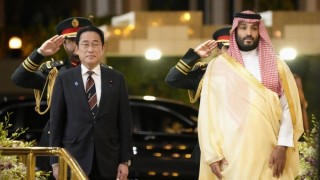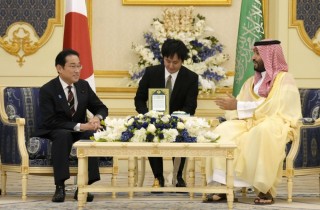Loading
Search
▼ Japan, Saudi Arabia Push Forward On Decarbonization Tech Tie-Up
- Category:Other
Japanese Prime Minister Fumio Kishida and Saudi Arabia's Crown Prince Mohammed bin Salman on Sunday agreed to cooperate in sharing technology to aid in the decarbonization and economic diversification of the Middle Eastern nation, while ensuring Japan's ongoing access to its oil.
The two agreed to launch a "strategic dialogue" at the foreign minister level to deepen bilateral collaboration in a meeting in Jeddah on the west coast of the Arabian Peninsula.
Through its engagement with Riyadh, Japan is seeking to guarantee its supply of oil remains stable, while Saudi Arabia is banking on investments in advanced Japanese technology to build a more diversified economy.
They signed 26 memorandums of cooperation in the energy sector, with Tokyo providing Riyadh with technologies to expand its solar power generation capabilities and innovations in the use of hydrogen and ammonia as a clean fuel source.
Japan imports nearly all crude oil it consumes, with oil from Saudi Arabia accounting for about one-third of the total, making the Middle Eastern country a crucial energy partner. Concerns around supply have become especially heightened recently due to the disruption caused by Russia's invasion of Ukraine.
Saudi Arabia is in the midst of efforts to reduce its dependence on oil exports and is striving to build a stronger private-sector economy under its Vision 2030 economic reform blueprint and is interested in Japan's energy technology know-how.
Executives from about 40 Japanese companies are accompanying the prime minister on his four-day trip from Sunday.
"We are shifting away from the existing relationship of an oil importer and an exporter and will deepen a new global partnership for the decarbonization era," Kishida said after the meeting with the crown prince.
The two also reaffirmed their joint efforts to stabilize the global oil market, after prices surged following Russia's invasion of Ukraine.
The two agreed to launch a "strategic dialogue" at the foreign minister level to deepen bilateral collaboration in a meeting in Jeddah on the west coast of the Arabian Peninsula.
Through its engagement with Riyadh, Japan is seeking to guarantee its supply of oil remains stable, while Saudi Arabia is banking on investments in advanced Japanese technology to build a more diversified economy.
They signed 26 memorandums of cooperation in the energy sector, with Tokyo providing Riyadh with technologies to expand its solar power generation capabilities and innovations in the use of hydrogen and ammonia as a clean fuel source.
Japan imports nearly all crude oil it consumes, with oil from Saudi Arabia accounting for about one-third of the total, making the Middle Eastern country a crucial energy partner. Concerns around supply have become especially heightened recently due to the disruption caused by Russia's invasion of Ukraine.
Saudi Arabia is in the midst of efforts to reduce its dependence on oil exports and is striving to build a stronger private-sector economy under its Vision 2030 economic reform blueprint and is interested in Japan's energy technology know-how.
Executives from about 40 Japanese companies are accompanying the prime minister on his four-day trip from Sunday.
"We are shifting away from the existing relationship of an oil importer and an exporter and will deepen a new global partnership for the decarbonization era," Kishida said after the meeting with the crown prince.
The two also reaffirmed their joint efforts to stabilize the global oil market, after prices surged following Russia's invasion of Ukraine.
Kishida did not raise the alleged murder of Saudi dissident journalist Jamal Khashoggi at the Saudi consulate in Istanbul in 2018. The U.S. intelligence community concluded that the crown prince approved an operation that resulted in the killing, causing a global outcry.
In an earlier meeting with Gulf Cooperation Council Secretary General Jasem Mohamed al-Budaiwi, Kishida agreed to resume negotiations on a free trade deal and to have the Japanese foreign minister hold regular meetings with counterparts from GCC member nations.
Kishida, who served as foreign minister for around five years through 2017, has been eager to strengthen relations with the six-member GCC composed of Bahrain, Kuwait, Oman, Qatar, Saudi Arabia and the UAE to secure stable supplies of oil and natural gas.
After the visit to Saudi Arabia, Kishida is slated to travel to the United Arab Emirates and Qatar.
In an earlier meeting with Gulf Cooperation Council Secretary General Jasem Mohamed al-Budaiwi, Kishida agreed to resume negotiations on a free trade deal and to have the Japanese foreign minister hold regular meetings with counterparts from GCC member nations.
Kishida, who served as foreign minister for around five years through 2017, has been eager to strengthen relations with the six-member GCC composed of Bahrain, Kuwait, Oman, Qatar, Saudi Arabia and the UAE to secure stable supplies of oil and natural gas.
After the visit to Saudi Arabia, Kishida is slated to travel to the United Arab Emirates and Qatar.
- July 17, 2023
- Comment (0)
- Trackback(0)



